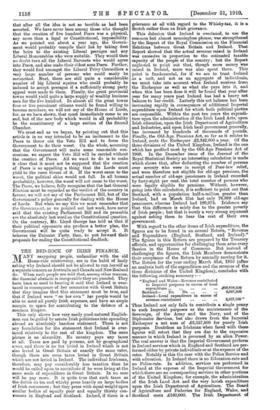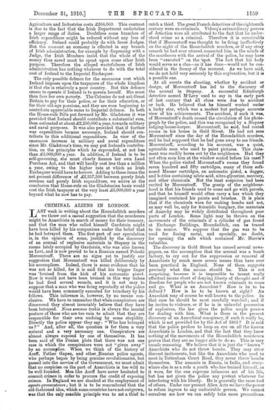THE BED-ROCK OF TRISH FINANCE. A ,FANY easygoing people, unfamiliar with
the old .1 Home-rule controversy, are in the habit of lazily asking why Ireland should not be allowed to run herself as a separate concern as Australia and Canada and New Zealand do. When such people are told that, among other reasons, the financial obstacle is insuperable they are puzzled. They have been so used to bearing it said that Ireland is over- taxed in consequence of her connexion with Great Britain that they imagine that this statement must be true, and that if Ireland were " on her own " her people would be able to meet all purely Irish expenses, and have an ample margin to spare for contributing to the defence of a common Empire.
This only shows how very easily good-natured English- men can be gulled by astute Irish politicians into spreading abroad an absolutely baseless statement. There is not any foundation for the statement that Ireland is over- taxed relatively to the rest of the kingdom. The mere phrase is an absurdity. No country pays any taxes at all. Taxes are paid by persons, not by geographical areas, and there is no tax levied in Ireland which is not also levied in Great Britain at exactly the same rates, though there are some taxes levied in Great Britain which are not levied in Ireland. The individual Irishman, therefore, may pay considerably less taxation than he would be called upon to contribute if he were living at the same scale of expenditure in Great Britain. In no case will he pay more. It is quite true that such taxes as the duties on tea and whisky press heavily on large bodies of Irish consumers ; but they press with equal weight upon similar bodies of equally poor and equally thirsty con- sumers in England and Scotland. Indeed, if there is a grievance at all with regard to the Whisky-tax, it is a Scotch rather than an Irish grievance.
This delusion that Ireland is overtaxed, to use the common but almost meaningless phrase, was strengthened by the Report of the Royal Commission on the Financial Relations between Great Britain and Ireland. That Report showed that the actual revenue raised in Ireland was excessive in proportion to the estimated taxable capacity of the people of the country ; but the Report neglected to point out that, though more money was raised in Ireland, more was also spent there. This point is fundamental, for if we are to treat Ireland as a unit, and not as an aggregate of individuals, we must take into account what Ireland receives from the Exchequer as well as what she pays into it, and when this has been done it will be found that year after year for many years past Ireland has had a heavy net balance to her credit. Latterly this net balance has been increasing rapidly in consequence of additional Imperial expenditure upon Ireland for which both political parties are responsible. Within the past ten years the expendi- ture upon the administration of the Irish Land Acts, upon Irish education, upon the Irish Department of Agriculture and Industries, and upon Irish local government generally, has increased by hundreds of thousands of pounds. Finally, the Old-Age Pensions Act, so far as it relates to Ireland, costs the Exchequer £2,342,000 a year. Of the three divisions of the United Kingdom, Ireland is the one which has profited most by the Old-Age Pensions Act of 1908. In the December issue of the Journal of the Royal Statistical Society an interesting calculation is made which shows that, after deducting the number of persons over seventy who were in receipt of Poor-law relief, and were therefore not eligible for old-age pensions, the actual number of old-age pensioners in Ireland exceeded by forty-eight per cent. the total number of persons who were legally eligible for pensions. Without, however, going into this calculation, it is sufficient to point out that Scotland, with a population half-a-million greater than Ireland, had on March Slat last only 76,889 old-age pensioners, whereas Ireland had 180,974. Irishmen say that this difference is solely due to the greater poverty of Irish people ; but that is surely a -very strong argument against asking them to bear the cost of their own government.
With regard to the other items of Irish expenditure, the figures are to be found in an anneal Return, " Revenue and Expenditure (England, Scotland, and Ireland)." The figures in this Return are prepared by the Treasury officials, and opportunities for challenging them arise every Session in the House of Commons. But instead of challenging the figures, the Irish Members demonstrate their acceptance of the Return by annually moving for it. The Return for the year ending March 31st, 1910 (after an analysis both of the expenditure and the revenue of the three divisions of the United Kingdom), concludes with the following striking summary:—
"England and Wales—Revenue contributed to Imperial purposes in excess of local X56,838,500 Scotland— Do. Do. ... ... 6,687,500 Ireland—Local expenditure in excess of revenue contributed ... ... 2,357,500 "
Thus Ireland not only fails to contribute a single penny to such Imperial purposes as the maintenance of the Sovereign, of the Army and the Navy, and of the Diplomatic Services, but also draws from the Imperial Exchequer a net sum of £2,357,500 for purely Irish purposes. Doubtless an Irishman when faced with these figures will retort that they are due to the expensive manner in which Ireland is governed by an alien Power. The real answer is that the Imperial Government perform in Ireland services which in England and Scotland are per- formed either by private individuals or at the expense of the rates. Notably is this the case with the Police Service and with education. In Ireland there is no Education-rate and no Police-rate. In addition, services are performed in Ireland at the expense of the Imperial Government for which there are no corresponding services in other portions of the United Kingdom; for example, the administration of the Irish Land Act and the very lavish expenditure upon the Irish Department of Agriculture. The Board of Agriculture and Fisheries for England, Wales, and Scotland costs £160,000. The Irish Department of Agriculture and Industries costs £264,000. This contrast is due to the fact that the Irish Department undertakes a larger range of duties. Doubtless some branches of Irish expenditure might be reduced without any loss of efficiency. Ireland could probably do with fewer Judges. But the moment an economy is effected in any branch of Irish administration' for example by dispensing with a Judge, the Irish Members insist that the whole of the money thus saved must be spent upon some other Irish purpose. Therefore the alleged wastefulness of Irish administration has nothing whatever to do with the total cost of Ireland to the Imperial Exchequer.
The only possible defence for the enormous cost which Ireland imposes upon the taxpayers of the whole kingdom is that she is relatively a poor country. But this defence ceases to operate if Ireland is to govern herself. She must then face her own poverty. The Colonies do not ask Great Britain to pay for their police, or for their education, or for their old-age pensions, and they are even beginning to contribute appreciable sums to Imperial defence. In both the Home-rule Bills put forward by Mr. Gladstone it was provided that Ireland should contribute a substantial sum, then estimated at about £2,250,000 a year, towards military and naval purposes. It was also provided that if further war expenditure became necessary, Ireland should con- tribute to this additional expenditure. In view of the enormous increase in military and naval expenditure since Mr. Gladstone's time, we may put Ireland's contribu- tion, on the principles which he expounded, at not less than £3,000,000 a year. In addition, if Ireland is to be self-governing, she must clearly finance her own Land Purchase Act, and that will hardly cost less than a million a year, owing to the higher rate at which an Irish Exchequer would. have to borrow. Adding to these items the net present difference of £2,357,500 between purely Irish revenue and purely Irish expenditure, we arrive at the conclusion that Home-rule on the Gladstonian basis would cost the Irish taxpayer at the very least £6,000,000 a year beyond what he now has to pay.







































 Previous page
Previous page